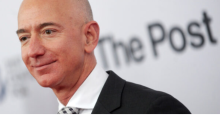
Jeff Bezos has finally taken the halo off of his head. It should have never been there in the first place.
Ever since his $250 million purchase of the storied Washington Post in 2013, Bezos has been feted as a savior of the free press (e.g., Slate, 8/6/13; Business Insider, 5/15/16; AdWeek, 11/28/16; New York Times, 2/27/21; Guardian, 6/12/24). The endless fawning was always misplaced. And for me, having grown up watching my parents run the local newspaper, this praise was nauseating.
While Facebook and Google have rightly been called out for destroying the news business, Amazon has been given a comparative pass, even though it may be the worst offender.
Amazon may hoover up a smaller (but growing) portion of ad revenue than Google and Facebook. But its ruthless business practices have helped turn once vibrant Main Streets into ghost towns across the country. Thanks to Amazon, it’s not just ad dollars being lost, but the advertisers themselves—local bookstores, clothing stores, toy stores, etc. And those losses destabilize fragile local economies, and the newspapers that depend on them.
If current trends continue, by the end of the year the US will have lost one-third of its newspapers and nearly two-thirds of its journalism jobs in a span of just two decades, according to a 2023 report by Northwestern University’s Medill Local News Initiative. The number of lost reporting jobs, 43,000, is more than enough to fill DC’s baseball stadium.
‘A terrible mistake’
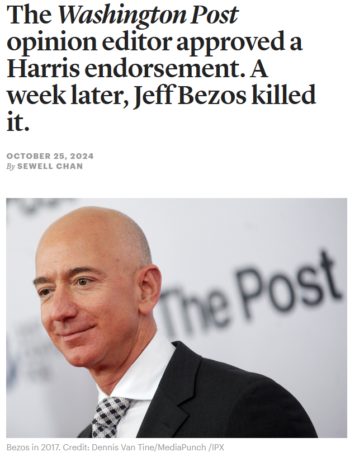
CJR (10/25/24): “Journalists at the Post, in both the news and opinion departments, were stunned” to learn that the paper would not be issuing a presidential endorsement.”
Fortunately, we won’t have to read this Bezos-saves-the-free press drivel any longer, which may be the only good thing to come out of his halo-off moment.
That moment came last Friday when the Post announced that it will no longer be endorsing for president, breaking with its decades-long precedent, and providing a shot in the arm to Trump’s candidacy. The Post’s move came a week after the LA Times, another billionaire-owned paper, did likewise (FAIR.org, 10/25/24).
In short order, Bezos’ top lieutenants at the Post dutifully fell on their swords, claiming it had been their decision. But simultaneously they (or others) leaked to the media that the decision was in fact Bezos’ alone, and they’d even argued against it (New York Times, 10/27/24). In fact, the Post editorial board had been working on its draft endorsement of Kamala Harris for weeks, and for the past week had been awaiting only the sign-off from the top that Bezos never gave (CJR, 10/25/24).
The gold star for trying-to-put-a-happy-face-on-this-hot-mess goes to Will Lewis, the Post CEO and publisher. Bezos tapped the Brit for the paper’s top job last year despite his shady right-wing past. In attempting to defend the indefensible, Lewis (Washington Post, 10/25/24) wrote, “we are returning to our roots.”
No one found this terribly convincing, not even Post columnists, 21 of whom signed onto a statement (10/25/24) calling the non-endorsement “a terrible mistake.” “Disappointing” is how the famed Post duo of Bob Woodward and Carl Bernstein put it. But maybe the harshest criticism came from former Post executive editor Marty Baron, who called it “cowardice, a moment of darkness that will leave democracy as a casualty.”
The fallout from Bezos spiking the Harris endorsement has been swift. Since Friday, nearly a third of the Post’s 10-person editorial board has resigned in protest, two Post columnists have departed the paper entirely (with more resignations expected), and 250,000 readers—10% of the Post’s total—have canceled their subscriptions. “It’s a colossal number,” said another former Post executive editor, Marcus Brauchli.
Bezos’ blocking of the Harris endorsement came just 11 days before the election, and on the heels of the Post issuing endorsements for lower-level offices like Senate and House—a practice the Post will continue, even as it discontinues endorsing for president, the one office that can seriously threaten Amazon’s sprawling interests.
Hedging Bezos’ bets
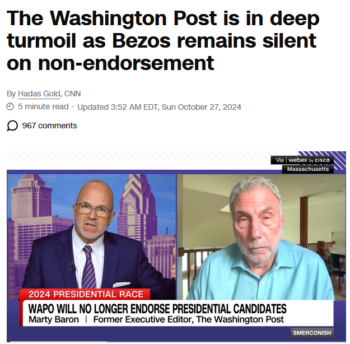
Former Washington Post executive editor Marty Baron (CNN, 10/27/24): “Trump rewards his friends and he punishes his perceived political enemies and I think there’s no other explanation for what’s happening right now.”
“This is obviously an effort by Jeff Bezos to curry favor with Donald Trump in the anticipation of his possible victory,” Post columnist and opinion editor Robert Kagan, who resigned in protest after 25 years at the paper, told CNN (10/27/24):
Trump has threatened to go after Bezos’ business. Bezos runs one of the largest companies in America. They have tremendously intricate relations with federal government. They depend on the federal government.
Recall that Trump as president routinely attacked Amazon and Bezos over the Post’s coverage of him. Trump even went so far as to upend a $10 billion cloud-computing deal between the Pentagon and Amazon Web Services. (Amazon then sued; the contract was ultimately divided among four companies, including Amazon.)
With Trump’s return to office looking as likely as not, Bezos has reason to hedge his bets. That’s especially true considering how dependent on federal largess Bezos’ space company, Blue Origin, also is. It currently has a $3.4 billion contract with NASA, and is expected to compete for $5.6 billion in Pentagon contracts over the next five years. Surely this came up when Blue Origin’s CEO met with Trump only hours after the Post announced its non-endorsement (Guardian, 10/27/24). (Blue Origin’s chief competitor is SpaceX, headed by Trump superfan Elon Musk.)
‘Endorsements do nothing’
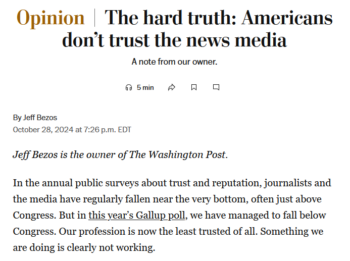
“Something we are doing is clearly not working,” writes Jeff Bezos (Washington Post, 10/28/24)—and he’s decided that “something” is endorsing presidential candidates.
With all hell breaking loose in the wake of his personal electioneering, Bezos—who can rarely be bothered to explain himself to the free press he supposedly cherishes—had to interrupt his European vacation to pen an op-ed for the Post (10/28/24).
Mustering all the humility you’d expect from the world’s third-richest man, Bezos began not with an apology but an attack—directed at, of all things, the media, including his own paper.
“In the annual public surveys about trust and reputation, journalists and the media have regularly fallen near the very bottom,” Bezos wrote at the top of his op-ed, headlined “The Hard Truth: Americans Don’t Trust the News Media.”
The fact that Bezos’ last-minute nixing of the Harris endorsement will only worsen trust in the media went unstated, of course. Thin-skinned billionaires are better at pointing fingers.
Bezos’ op-ed continued:
Presidential endorsements do nothing to tip the scales of an election. No undecided voters in Pennsylvania are going to say, “I’m going with Newspaper A’s endorsement.” None.
And with that, Bezos absolved himself of any role in aiding Trump’s potential return to the Oval Office.
But in the eyes of Trump fundraiser Bill White, it sure looks like Bezos just put his thumb on the scale. “Bezos not endorsing Kamala Harris—I think that’s a $50 million endorsement for Trump,” White told the Post (10/28/24). “Not picking a horse is picking a horse.”
‘No quid pro quo’
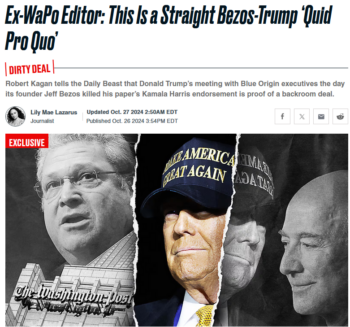
Robert Kagan (Daily Beast, 10/26/24): “All Trump has to do is threaten the corporate chiefs who run these organizations with real financial loss, and they will bend the knee.”
The billionaire went on to assure readers that there was “no quid pro quo of any kind” regarding the meeting between the Blue Origin CEO and Trump that took place immediately following the non-endorsement.
Bezos may have penned this line in response to Kagan, the recently departed Post columnist who two days earlier told the Daily Beast (10/26/24) that a quid pro quo is exactly what went down:
Trump waited to make sure that Bezos did what he said he was going to do, and then met with the Blue Origin people…. Which tells us that there was an actual deal made, meaning that Bezos communicated, or through his people, communicated directly with Trump, and they set up this quid pro quo.
While Bezos’ non-endorsement may seem like a last-minute decision, it had “obviously been in the works for some time,” Kagan said, citing Lewis’ hiring as Post CEO and publisher back in January.
Lewis rose to prominence over a decade ago when he helped steer the British wing of Rupert Murdoch’s media empire to calmer waters, at a time when Murdoch’s tabloid News of the World was engulfed in a phone-hacking scandal. While Lewis’ actions during this time remain the subject of legal inquiries, Murdoch was quick to promote him, naming Lewis CEO of Dow Jones and publisher of the Wall Street Journal in 2014.
When Bezos tapped Lewis to helm the Post earlier this year, he was aware of Lewis’ shady background (Washington Post, 6/28/24)—and may have even viewed it as a plus.
“[Lewis’] eager solicitude before power could well be why Washington Post owner Jeff Bezos tapped Lewis for the publisher’s job in the first place,” the Nation’s Chris Lehmann (6/21/24) wrote. “[Bezos] may well look at Murdoch’s sleazy antidemocratic empire and think, ‘I want one of those, too.’ If so, his eager quisling Will Lewis is already hitting all the right notes.”
For Kagan, Lewis’ hiring was an early signal of Bezos’ intention to take the Post in a different, right-wing direction. “All the facts” point to Bezos’s desire to remake the Post in the image of the Wall Street Journal, with an “anti-anti-Trump editorial slant,” Kagan told the Daily Beast (10/26/24).
Amazon’s antitrust antipathy
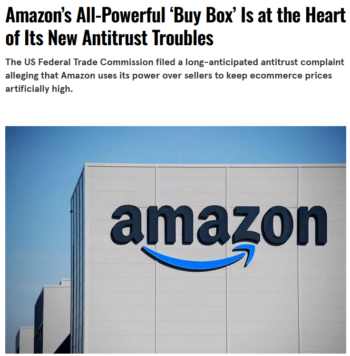
FTC chair Lina Khan (Wired, 9/26/23): “Amazon is now exploiting its monopoly power to enrich itself while raising prices and degrading service for the tens of millions of American families who shop on its platform.”
While media are focused on how Bezos bent the knee for Trump, something important has been left out of the story: namely, that it may be President Harris whom Bezos fears most.
A second Trump presidency may put Amazon’s (and Blue Origin’s) current government contracts in danger, but it’s Biden’s Federal Trade Commission chair, Lina Khan, who poses a more serious long-term threat to Amazon, as she seeks to break apart dominant monopolies like the online retail giant, which she’s currently suing.
If Harris wins, there’s a possibility that Khan will stay put, enabling her to continue building on the Biden administration’s aggressive antitrust enforcement.
While the FTC’s case against Amazon hasn’t received much attention, it “marks the biggest legal test to date for Amazon’s 30-year-old e-commerce business,” according to the Post (10/1/24). Khan’s lawsuit—which is joined by 17 state attorneys general—alleges that the retailer is “punishing sellers who offer their goods elsewhere at lower prices,” according to Wired (9/26/23)—keeping prices artificially high not only at Amazon, but at thousands of other sites across the web.
In addition to antitrust enforcement, there’s another reason that Bezos (and his ilk) may prefer Trump. “Further compounding the incentive for some executives to stay out of the race is Democrats’ policy agenda,” the Post (10/28/24) reported. “Harris has backed a plan to raise taxes on many of the country’s highest earners.”
For Bezos’ part, he insists (10/28/24), “I do not and will not push my personal interest.” But now that the halo is off, it’s easier to see this is nonsense.
“With Jeff, it’s always only about business,” a former Blue Origin employee told the Post (10/30/24). “It’s business, period. That’s how he built Amazon. That’s how he runs all of his enterprises.”
By PETE TUCKER
Pete Tucker is a journalist based in DC. He writes at petetucker.substack.com.
